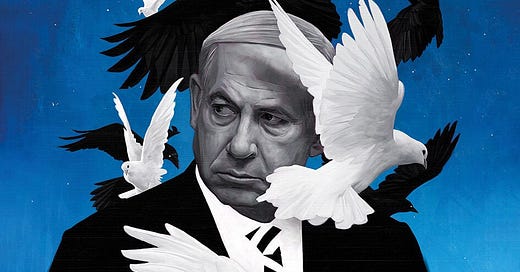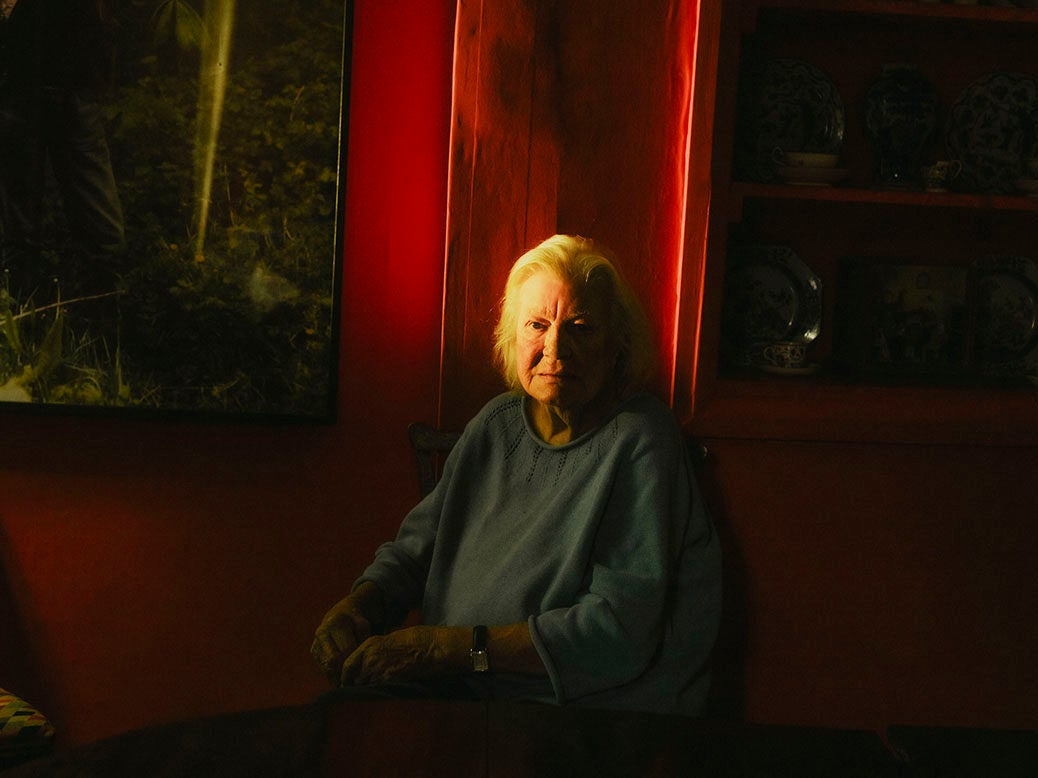The Saturday Read: The Sicilian Defence
Inside: Benjamin Netanyahu, Rachel Reeves, Tucker Carlson, Fred Again and poetry’s royalty.
Good morning. Welcome to the Saturday Read, the New Statesman’s guide to politics, culture, books, and ideas. This is Finn with Pippa, George, and Freddie.
Russia’s expulsion of six British diplomats – on allegations of espionage and sabotage – is a nadir in Anglo-Russian relations. They are at their lowest point, for obvious reasons, since the Cold War (the Kremlin sees the UK as Europe’s “Russophobe-in-chief”). And, the possibility of Britain and the US allowing Ukraine to use long-range missiles to strike Russian territory seems to have turbo-charged tensions. The Foreign Office didn’t mince its words when confronted with Russia’s spying allegations, describing the claim as both “baseless and ludicrous”. My colleague Katie explains the stakes of Vladimir Putin’s latest move here.
Meanwhile, on Thursday I attended a symposium held by the think tank Policy Exchange on the future of the left in Britain. Over the course of our discussion we kept finding ourselves rerouted to the same themes: family, community, immigration and national identity. It is interesting to consider whether a conversation on the future of the left would cohere around these ideas even just ten years ago. But the left is a very different proposition now than in the 2010s (a decade beset by moral piety and the strictures of progressivism). I wonder if Keir Starmer – a week out from Labour conference – is getting any closer to being able to sell his story on Britain, Labour and the left in 2024. He hasn’t managed it so far.
The picks…
As usual, we have a great selection of writers this week. George Eaton writes our cover story on Rachel Reeves (“the iron chancellor”); John Gray is on top form in asking what we can learn from JG Ballard; and I was particularly taken by Fergal Kinney’s smart and generous piece on EDM’s anti-hero, Fred Again. Our Washington correspondent Freddie signs us off with some thoughts on Kamala Harris’s 2019 biography. As ever, thanks for reading and have a good weekend.
1—“The spectre of past Labour governments haunts the Treasury.”
It’s been a tough week for Labour (we seem to be saying that more and more these days…). In our cover story this week, George Eaton questions the politics of Rachel Reeves’ spending cuts. Open to find out the Chancellor’s favourite chess move, stay for George’s expert political rune-reading. FMcR
Should Reeves U-turn on fuel payments she will be branded “weak” – incapable of delivering the tax rises and spending cuts she has warned of. Should she persist, she will be labelled “cruel”. The nightmare scenario for the Chancellor is one in which she becomes perceived as both.
It was Denis Healey, the former Labour chancellor, who declared that his “first law of politics” was “when you’re in a hole, stop digging”. Rachel Reeves’ bet is that she is digging for victory.
2—“There is an intellectual sickness on the American right.”
Why is there now such a foul stink around free speech, which seemed so pristine and virtuous in, say, 1644, when Milton published Areopagitica? Well, Sohrab explains, it’s largely because contemporary exponents aren’t exactly Milton. GM
This leaves conservative institutions dominated by doctrinaire hacks who can churn predictable opinion pieces, but can’t report or write at anywhere close to the level expected of left-of-centre counterparts. There are many applicants to be the next Fox or Newsmax loudmouth, but few young rightists aspire to the excellence and enterprise daily showcased by the “New York Times” or the “New York Review” (for all their shortcomings). Being a successful loudmouth is much easier: all you need is to bellow about how “they” want us to eat bugs and take poison vaccines.
3—“It took me 20 years to forget, and 20 years to remember.”
Here’s a piece that might prompt a re-evaluation of your entire life. John Gray on JG Ballard and the 40th anniversary of Empire of the Sun, and what we might learn from him about freedom. Also, how good is that pic? GM
Human memory is a constant reprocessing of our lives. As the world keeps on unmaking us, we remake ourselves or our lives are spent in forgetting. Freedom is found not in bourgeois autonomy, a stately progress through successive phases of life, but in situations that shatter our idea of linear time and force us to relinquish our beliefs about the future and the past. If Ballard’s work has a message, it is that rather than banishing from our minds the chaos that regularly engulfs us, we are better off accepting and learning to find meaning in it.
The man I knew over relaxed lunches in London may not have fully healed himself. I suspect the scenes he witnessed after the evacuation of the camp never ceased to trouble him. Yet through his work he released his traumas from darkness and turned vistas of desolation and abandonment into luminous images, which helped him live on and find happiness.
4—“I’m very comfortable with men shouting at me.”
Lynn Barber is a journalist like no other: the idea of a print celebrity interviewer did not exist before her, and none has since matched her. As she turns 80, Barber spoke to Kate Mossman about what she expected to be doing at this age (“dead”), Boris Johnson, and being talked over at dinner parties. PB
Her first book, published in 1973 after a few years working in “Penthouse” magazine in her twenties, was a sex manual called “How to Improve Your Man in Bed”. There is a rather sweet chapter on impotence: how to outwit the disastrous thought processes that cause it in your man. And there is a chapter on oral sex: “By now, your man is technically performing cunnilingus. However, he is still not doing it very well and you may be disappointed that you enjoy it less than anticipated.”…
The final chapter has a marked change of tone, explaining the benefits of threesomes, or “troilism” as she called it then: “The idea of going out together ‘prospecting’ for a suitable girl, and then inviting her home, makes for a delicious sort of liaisons dangereuses conspiracy. Happy hunting!” Barber later tells me by email, “‘Penthouse’ was always raving on about threesomes, so I tried them once or twice but never that keen. Lynn.”
To enjoy our latest analysis of politics, news and events, in addition to world-class literary and cultural reviews, click here to subscribe to the New Statesman. You’ll enjoy all of the New Statesman’s online content, ad-free podcasts and invitations to NS events.
To meet the government’s clean power 2030 target we need two things: pace and policy. The recent energy crisis cost the UK taxpayer an estimated £75bn on payments for wholesale gas. The energy crisis was a lesson in the costs of subcontracting energy security to others rather than building our own clean energy system. Learn more about how we unlock the UK’s renewable resources.
5—“Fred Again is on the move.”
Headline of the week goes to Fergal Kinney’s investigation into EDM’s “everybro”. Fred Again – with his “polite, emotive” music – has become one of Britain’s biggest stars. Kick off your weekend with his charmingly mawkish track “Adore U”. FMcR
Not that this slowed brand Fred. His 2023 Glastonbury set became one of that year’s most-talked about performances. Not because of a standout singalong track, or one of the festival’s many political homilies, but because – as the sun descended behind a ram-packed Other Stage in front of a visibly grateful and awed performer – he had created a moment.
6—“Generosity of attention and subtlety of interpretation.”
Here is a parade of poetry’s royalty with the former poet laureate Andrew Motion writing about WH Auden. A new biography by Nicholas Jenkins examines the period between the great 20th-century Englishman’s first poem when he was 15, and the 1936 publication of Look, Stranger!, the collection that made Auden famous. GM
The “hurt” had a personal aspect as well as a social and historical one. Auden was born in York in 1907, raised in Birmingham (where his father worked as a medical officer and professor at the university), and educated in private schools in Surrey and Norfolk. Less well known is that Auden senior served at Gallipoli during the war – and Jenkins, across several pioneering pages, boldly argues that this loss of a significant male authority figure (complicated by the affair his father had while away) contributed to Auden’s early self-identification as gay. As early as 1920, the year that Auden left his prep school (St Edmund’s, in Hindhead, Surrey where Christopher Isherwood was his contemporary) and went to Gresham’s in Norfolk, he was beginning to create in his poems a landscape that was at once highly personal (a “dream country” of the mind) and also literal – a world of abandoned mines and lonely, rainswept northern uplands, where the ravages of recent history were interwoven with formative self-scrutinies.
7—“English football’s most compelling story.”
Simon Kuper reviews a new historical novel about the 1956 Munich air disaster. Of the 44 people on board, 23 died. Eight of them were “Busby Babes”, Manchester United players who played under manager Matt Busby. The writer, David Peace, has “become almost the novelist laureate of English football” – but this legend looms a little too large for him. GM
Busby was carried from the plane’s wreckage so close to death that the last rites were read twice. (United was a mostly Catholic club then.) In Peace’s telling, he was too weak to support anaesthesia, and so underwent several operations without. At first, his team’s destruction was hidden from him, but Busby deduced what had happened, largely by observing which players hadn’t visited his hospital bed. In a gruesome scene, he makes his wife confirm his worst fears, player by player: “Roger Byrne, asked Matt. Jean shook her head. Mark Jones, asked Matt. Jean shook her head. David Pegg, asked Matt. Jean shook her head.”
8—“As a leader, Netanyahu has worked magic.”
Benjamin Netanyahu is the great survivor of Israeli politics, holding high office for nearly three decades – despite controversy and scandal. However, in the wake of the 7 October attacks, polling has shown consistent majorities among Israelis in favour of him stepping down as prime minister. John Jenkins asks: can Netanyahu prevail once again? PB
Israel cannot defeat Iran. It is too large, too far away, with a tenacity and resilience born of revolutionary zeal. Plus, its relationships with both China and Russia have evolved over the past decade to the point where they look semi-permanent. Israel can deter this coalition for a time. But then what? Israel cannot simply rely on the Islamic Republic collapsing under the weight of its admittedly serious domestic contradictions. A sensible strategy is to nullify Hamas and prevent it from ever returning to rule in Gaza, then do the same to Hezbollah in Lebanon. But, as we have seen in Gaza, the cost in human lives and in material resources would be very high. And Israel would need to know it had the unconditional, long-term support of the US.
George’s Best of the Rest
John Lanchester: What is finance for? See item nine.
Helen Lewis: How Joe Rogan remade Austin, Texas
Brittany Spanos: Chappell Roan is a pop supernova
Will Lloyd: On The Real Thing
Matthew Walther: The rise of post-literate history
Elaine Godfrey: The abortion absolutist
The rarest – and fluffiest – duvets in the world. £27,000 for a duvet?!
And with that…
Political memoirs tend to bear a dose of mental anguish – a reflection, perhaps, of the sort of people who make a career out of politics. Kamala Harris’s The Truths We Hold is an exception to prove this rule. Her childhood? Cloudless. Her mother Shyamala Gopalan? A fortress of “unwavering love and loyalty and support” (and “capable of anything”). She dedicated the book to her husband’s sense of “the funny”, and she chose her desk on the Senate floor for its proximity to the sweets drawer.
Harris extends this saccharine disposition to the rest of the world: she is the type of person who believes most problems can be solved by getting people round a table and talking them through; she seems to think most people are fundamentally well-intentioned.
The Truths We Hold was written a year before she ran for president, in 2019, a time when progressivism had a monopoly on public morality. Politics has changed since then and now a healthy scepticism has entered the mix. Has Harris adapted? She doesn’t talk so much about legalising marijuana any more, a sign – perhaps – that self-styling as a woke prosecutor wouldn’t work with the US electorate of 2024. She still defines herself by her optimism, though. But is that enough?
—Freddie
The New Statesman is home to the finest writing on politics, culture and ideas. To stay up to date, subscribe using the link above.

















